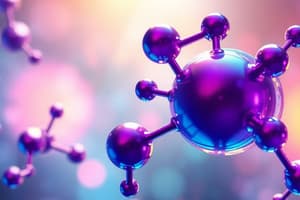Podcast
Questions and Answers
What is the backbone of life on Earth according to the text?
What is the backbone of life on Earth according to the text?
- Nitrogen
- Hydrogen
- Oxygen
- Carbon (correct)
Which type of bonds can carbon form with other carbon atoms?
Which type of bonds can carbon form with other carbon atoms?
- Single and double bonds
- Only single bonds
- Single, double, and triple bonds (correct)
- Only double bonds
How are organic molecules classified?
How are organic molecules classified?
- By their color
- By their size
- By their weight
- By their functional groups (correct)
Which of the following is NOT a common functional group in organic chemistry?
Which of the following is NOT a common functional group in organic chemistry?
What do functional groups determine in organic molecules?
What do functional groups determine in organic molecules?
Which of the following is NOT a type of reaction mechanism studied in organic chemistry?
Which of the following is NOT a type of reaction mechanism studied in organic chemistry?
What is the primary focus of organic synthesis?
What is the primary focus of organic synthesis?
Which field aims to create complex natural products from scratch using simple starting materials?
Which field aims to create complex natural products from scratch using simple starting materials?
What type of molecules are natural products?
What type of molecules are natural products?
What role do synthetic products play in organic chemistry?
What role do synthetic products play in organic chemistry?
How do advancements in organic chemistry contribute to society?
How do advancements in organic chemistry contribute to society?
What is one key benefit of understanding reaction mechanisms in organic chemistry?
What is one key benefit of understanding reaction mechanisms in organic chemistry?
Flashcards are hidden until you start studying
Study Notes
Exploring Organic Chemistry: The Study of Carbon-Based Molecules
Organic chemistry is a fascinating and fundamental branch of chemistry that deals with the study of carbon-based molecules. Carbon, with its unique ability to form bonds with other carbon atoms and various other elements, is the backbone of life on Earth. In this article, we'll dive into the captivating world of organic chemistry, focusing on its core concepts and key subfields.
Carbon-Centered Chemistry
Organic chemistry revolves around carbon, an element that can form single, double, and triple bonds with other carbon atoms, as well as single bonds with hydrogen, nitrogen, oxygen, and other elements. Carbon-carbon (C-C) bonds are unique because they can form long chains, branched structures, and cycles, allowing for a vast array of molecules.
Building Blocks: Functional Groups
Organic molecules are classified by their functional groups, which are specific atoms or groups of atoms that have characteristic chemical reactivity. Common functional groups include alkyl, alkenyl, alkynyl, carboxyl, hydroxyl, amine, and halogen groups. These functional groups determine a molecule's chemical behavior and reactivity, which makes them essential for understanding organic reactions.
Reaction Mechanisms and Pathways
Organic chemists study various reaction mechanisms, such as substitution, elimination, addition, and rearrangement reactions. Understanding these mechanisms allows chemists to predict and control the outcome of reactions in their laboratory. A few well-known reaction types include electrophilic aromatic substitution, nucleophilic substitution, and acid-base reactions.
Organic Synthesis
Building complex organic molecules from simpler starting materials is the primary focus of organic synthesis. Synthetic chemists use a wide array of reaction types, such as those mentioned above, to create medicines, pesticides, plastics, and other important materials. The field of total synthesis aims to create complex natural products, such as vitamins and antibiotics, from scratch using only simple starting materials.
Natural and Synthetic Products
Organic chemistry is intimately linked to the study of natural products, such as vitamins, antibiotics, and pharmaceuticals. Natural products are organic molecules produced by living organisms, while synthetic products are made by chemists in the laboratory. Natural products provide a wealth of information about the chemistry and biology of living organisms, as well as a source of inspiration for medicines and other useful compounds.
Organic Materials Science
Recent advancements in organic chemistry, such as the development of conducting polymers and organic light-emitting diodes (OLEDs), have led to the emergence of a new subfield known as organic materials science. This interdisciplinary field combines organic chemistry with materials science, physics, engineering, and other areas to create innovative materials for use in electronics, energy storage, and other applications.
Conclusion
Organic chemistry is a fascinating and diverse field that continues to inspire discovery and innovation. Its foundational concepts and techniques provide chemists with the tools necessary to create complex organic molecules, natural products, and innovative materials. As the field evolves, organic chemists will continue to make valuable contributions to science, technology, and society.
[Note: The content provided in this article is intended to be fact-rich and educational. It is not intended to be an exhaustive list of all possible topics in organic chemistry and should serve as an introduction to the field rather than a comprehensive guide.]
Studying That Suits You
Use AI to generate personalized quizzes and flashcards to suit your learning preferences.




